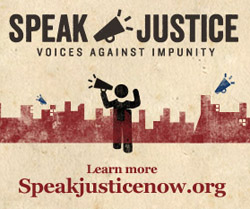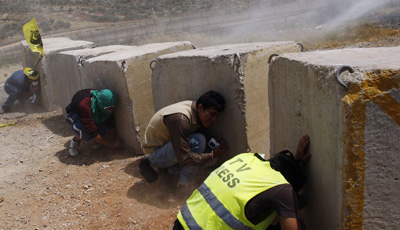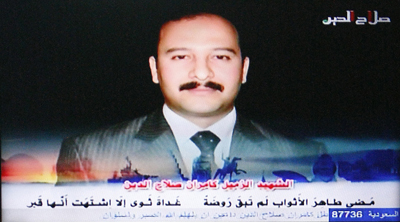
Speak Justice campaign fights impunity in press murders
The tortured and decapitated body of 39-year-old María Elizabeth Macías Castro was found on a Saturday evening in September 2011. It had been dumped by the side of a road in Nuevo Laredo, a Mexican border town ravaged by the war on drugs. Macías, a freelance journalist, wrote about organized crime on social media under…
Two Iraqi journalists killed in Syria
New York, July 18, 2012–Two Iraqi journalists living in Syria and covering the conflict in that country were killed on Saturday although news reports differed on crucial details. The Committee to Protect Journalists continues to investigate the circumstances of the deaths, which come amid reports of increasing violence toward Iraqis living in Syria.
Attacks on Iraqi journalists should be investigated
New York, May 9, 2012–The Committee to Protect Journalists condemns two official attacks on journalists working in Iraqi Kurdistan, including the assault on a television news crew and the arrest of an editor whose articles alleged corruption. CPJ also calls for an investigation into a car bombing that wounded a journalist in Baghdad.
Video: Getting Away With Murder
CPJ’s María Salazar-Ferro names the 12 countries where journalists are murdered regularly and governments fail to solve the crimes. Where are leaders failing to uphold the law? Where are conditions getting better? And where is free expression in danger? (4:46) Read CPJ’s 2012 Impunity Index. And visit our Global Campaign Against Impunity and see how…
Iraqi cybercrime bill is the worst kind
After the rash of political revolutions and criminal attacks on governments and companies last year, it wasn’t hard to predict that 2012 would be the year of a cybercrime crackdown. The United States is considering its own cybercrime legislation, and the European Union is seeking to harmonize its member state’s computer crime laws. Governments understandably…

Attacks on the Press in 2011: Evolution in Journalist Security
The danger of covering violent street protests has become a significant risk for journalists, alongside combat and targeted killings. Sexual assault, organized crime, and digital vulnerability are also hazards. The security industry is struggling to keep up. By Frank Smyth
Attacks on the Press in 2011: Iran’s Vast Diaspora
Journalists who have fled Iran to avoid prison face a tense and lengthy process toward resettlement, an uncertain financial and professional future, and most of all, fear that the Iranian government will catch up with them. By María Salazar-Ferro and Sheryl A. Mendez >> فارسي
Attacks on the Press in 2011: Iraq
Five journalists and a media worker were killed as Iraq maintained its position as one of the most dangerous countries for journalists. In August, the government adopted a law meant to offer journalists more protection, although its vague provisions did little initially to improve conditions. As demonstrations for economic and political reform spread with the…
